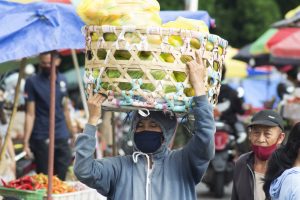COVID-19 continues to make alarming inroads in Indonesia, with the country recording a string of record daily caseloads over the past week. Yesterday, Indonesia notched more than 20,000 COVID-19 infections, the highest daily rise since the beginning of the pandemic. This followed a run of record totals in recent days, including 14,536 new cases on Monday and 15,308 on Wednesday.
Yesterday’s toll took the country’s total to just over 2.05 million confirmed infections, in addition to 55,949 deaths, making it the worst affected Southeast Asian nation, and the fourth-worst in per capita terms. As of Wednesday, the percentage of tests returning a positive result in Indonesia sat at more than 49 percent, nearly 10 times the 5 percent limit that the World Health Organization sees as an indication that an epidemic is under control.
As a measure of the sharpness of the increase, on June 10, the last time I wrote about COVID-19 in Indonesia, the country’s most recent daily total stood at 7,725 cases. With the line of infections now trending almost vertically, the pandemic is threatening to engulf the country’s health system. According to Indonesian media reports, occupancy rates at 97 hospitals in West Java are presently at 100 percent, while earlier this week hospital occupancy rates in the capital Jakarta sat at around 90 percent. This capacity crunch today prompted Indonesia’s health minister to order that all spare emergency rooms at Jakarta’s hospitals be converted into COVID-19 treatment facilities.
In an attempt to bring the outbreak under control the administration of President Joko “Jokowi” Widodo announced this week that it would further tighten movement restrictions, which will remain in place until July 5. Under the new restrictions, in high-risk areas or “red zones,” non-essential businesses will have to close at 8 p.m. and religious and social gatherings will be banned. Those who are able to will be required to work from home.
As a measure of the nationwide nature of the outbreak, these “red zones” span the Indonesian archipelago, from the capital Jakarta and other parts of Java to the Riau Islands, western Sumatra, and Kalimantan.
The rapid outbreak prompted the government of Hong Kong to halt all passenger flights from Indonesia on Wednesday, deeming the country’s arrivals “extremely high risk” for COVID-19. It has also threatened to disrupt Indonesia’s planned reopening of Bali and other islands to tourists from the beginning of July.
The present coronavirus surge has been blamed on millions traveling across the nation for the Eid holiday that marks the end of the Muslim fasting month of Ramadan, despite an official ban on travel. Indonesia is also grappling with new virus mutations, including the highly infectious delta variant first identified in India.
As the case numbers spiral out of control, the government has struggled to speed up its vaccination drive. This began in January has been hampered by supply and logistical issues, making it unlikely that it will reach its target of vaccinating 181.5 million people by the end of the year. So far, Indonesia has administered a single dose of vaccine to 24.36 million people, just under 9 percent of its population, according to the Our World In Data tracker.
This week, Jokowi set a target for 7.5 million out of 10.5 million people in the capital city Jakarta to be vaccinated by the end of August, making vaccines available to anyone over the age of 18. Earlier this month, the government also set an ambitious target of administering 1 million vaccinations per day, which would enable it to reach its nationwide goal by the end of the year.
Looming in the background, however, are questions about the efficacy of the Chinese-made vaccines that are central to Indonesia’s inoculation campaign.
This week brought the disquieting news that more than 350 Indonesian health workers had contracted the coronavirus despite being fully vaccinated with China’s Sinovac Biotech vaccine, part of a broader concern that some Chinese-made vaccines may be less effective against the COVID-19 delta variant. As of last weekend, Indonesia had received more than 104 million COVID-19 vaccines, 94.5 million of which were supplied by Sinovac.

































